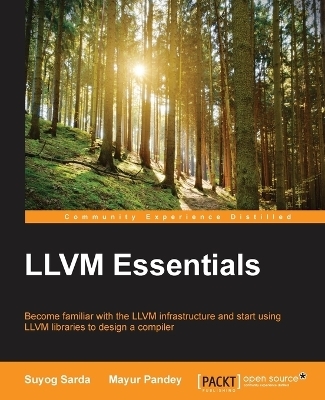
LLVM Essentials
Packt Publishing Limited (Verlag)
978-1-78528-080-1 (ISBN)
About This Book
• Learn to use the LLVM libraries to emit intermediate representation (IR) from high-level language
• Build your own optimization pass for better code generation
• Understand AST generation and use it in a meaningful way
Who This Book Is For
This book is intended for those who already know some of the concepts of compilers and want to quickly get familiar with the LLVM infrastructure and the rich set of libraries that it provides.
What You Will Learn
• Get an introduction to LLVM modular design and LLVM tools
• Convert frontend code to LLVM IR
• Implement advanced LLVM IR paradigms
• Understand the LLVM IR Optimization Pass Manager infrastructure and write an optimization pass
• Absorb LLVM IR transformations
• Understand the steps involved in converting LLVM IR to Selection DAG
• Implement a custom target using the LLVM infrastructure
• Get a grasp of C's frontend clang, an AST dump, and static analysis
In Detail
LLVM is currently the point of interest for many firms, and has a very active open source community. It provides us with a compiler infrastructure that can be used to write a compiler for a language. It provides us with a set of reusable libraries that can be used to optimize code, and a target-independent code generator to generate code for different backends. It also provides us with a lot of other utility tools that can be easily integrated into compiler projects.
This book details how you can use the LLVM compiler infrastructure libraries effectively, and will enable you to design your own custom compiler with LLVM in a snap.
We start with the basics, where you'll get to know all about LLVM. We then cover how you can use LLVM library calls to emit intermediate representation (IR) of simple and complex high-level language paradigms. Moving on, we show you how to implement optimizations at different levels, write an optimization pass, generate code that is independent of a target, and then map the code generated to a backend. The book also walks you through CLANG, IR to IR transformations, advanced IR block transformations, and target machines.
By the end of this book, you'll be able to easily utilize the LLVM libraries in your own projects.
Style and approach
This book deals with topics sequentially, increasing the difficulty level in a step-by-step approach. Each topic is explained with a detailed example, and screenshots are included to help you understand the examples.
Suyog Sarda is a professional software engineer and an open source enthusiast. He focuses on compiler development and compiler tools. He is an active contributor to the LLVM open source community. Suyog was also involved in code performance improvements for the ARM and X86 architectures. He has been a part of the compiler team for the Tizen project. His interest in compiler development lies more in code optimization and vectorization. Previously, he has authored a book on LLVM, titled LLVM Cookbook by Packt Publishing. Apart from compilers, Suyog is also interested in Linux Kernel Development. He has published a technical paper titled Secure Co-resident Virtualization in Multicore Systems by VM Pinning and Page Coloring at the IEEE Proceedings of the 2012 International Conference on Cloud Computing, Technologies, Applications, and Management at the Birla Institute of Technology, Dubai. He has earned a bachelor's degree in computer technology from the College of Engineering, Pune, India. Mayur Pandey is a professional software engineer and open source enthusiast focused on compiler development and tools. He is an active contributor to the LLVM open source community. He has been a part of the compiler team for the Tizen project and has hands-on experience of other proprietary compilers. He has earned a bachelor's degree in Information Technology from Motilal Nehru National Institute of Technology, Allahabad, India. Currently, he lives in Bengaluru, India.
| Erscheinungsdatum | 24.12.2015 |
|---|---|
| Verlagsort | Birmingham |
| Sprache | englisch |
| Maße | 75 x 93 mm |
| Themenwelt | Informatik ► Theorie / Studium ► Compilerbau |
| ISBN-10 | 1-78528-080-5 / 1785280805 |
| ISBN-13 | 978-1-78528-080-1 / 9781785280801 |
| Zustand | Neuware |
| Haben Sie eine Frage zum Produkt? |
aus dem Bereich


